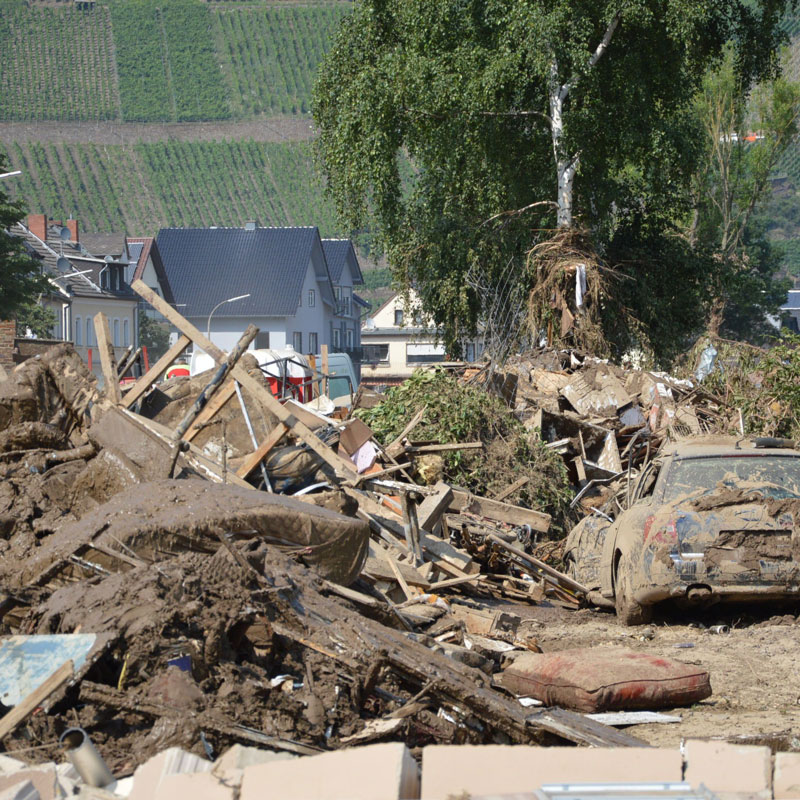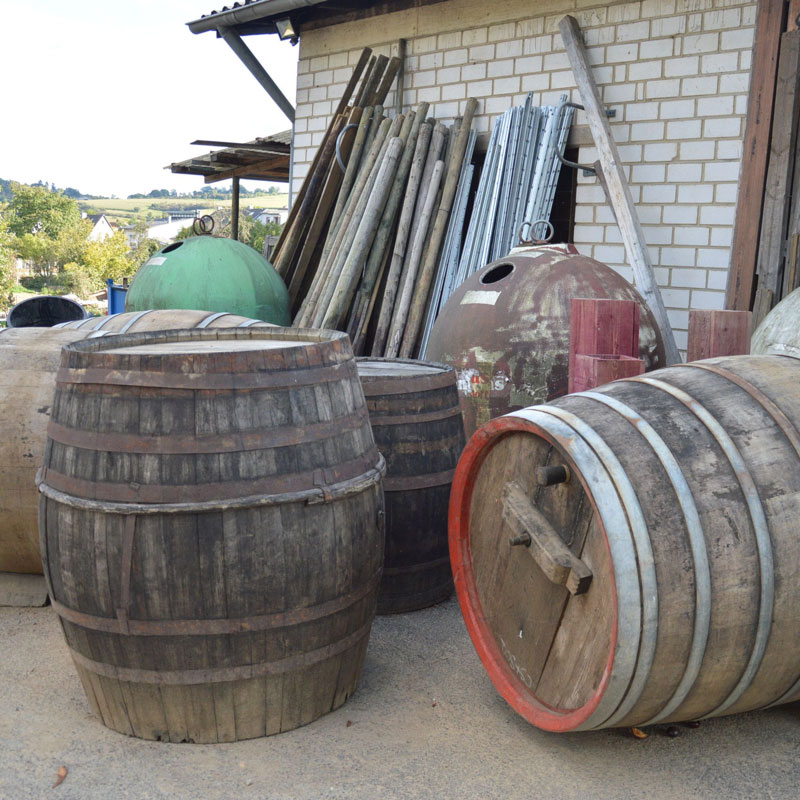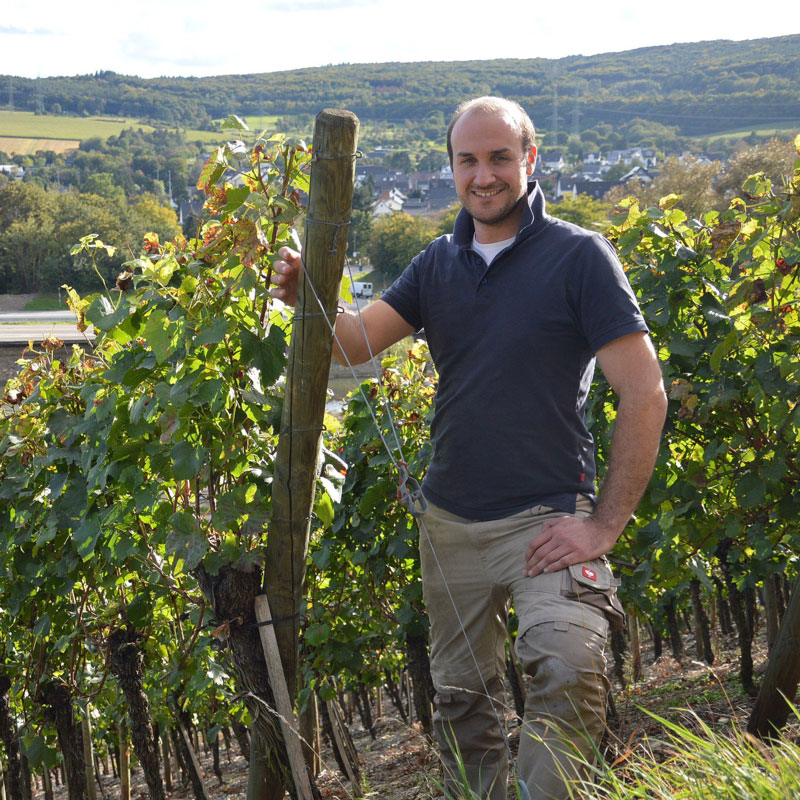 This is what it looked like in Dernau at the end of July
This is what it looked like in Dernau at the end of JulyHigh above the river, all is seemingly right with the world: the vineyards are green, the Pinot Noir on the vine is ripe. If it weren't for the deep furrows in the river down in the valley: The stream bed - a moonscape. A dented fuel oil tank lies on a slope. An entire lane of the main road on the other side is missing, torn away that night when the flood came. "The wave was eight metres high," says Philipp Nelles from the VDP winery of the same name, and adds: "When you look down there now, you think: was there something?"
We are standing high above the Ahr on the steep slope, where the Pinot Noir grapes of Nelles grow, one of the oldest and most renowned wineries here. Twelve weeks have passed since a gigantic flood wave rolled through the Ahr valley on the night of 14-15 July, sweeping away everything in its path. "There wasn't a barrel left in our cellar, a lot was lost," says Nelles, although his winery is several hundred metres from the shore.
Of 68 wineries in the Ahr valley, 65 suffered damage, some of it severe, on that night of the flood. Some wineries no longer have a cellar or a hall; the flood did not leave a single machine or barrel in place. The vineyards in the valley were also affected: "The flat vineyards are all flat," reports Peter Kriechel, managing director of the vineyard of the same name in Ahrweiler and chairman of Ahrwein e.V..
 Broken barrels and wine tanks at the Nelles winery
Broken barrels and wine tanks at the Nelles winery32.5 hectares of vineyards were completely washed away by the flood wave, in some cases torn away metres deep. It is doubtful whether vineyards will ever stand here again. Another 15 hectares of vineyards were flooded so high that the vines were covered with a layer of mud. The grape harvest is completely cancelled here. The Mainz Ministry of Viticulture estimates that these areas will only produce a low yield in 2022 because the plants can only carry out insufficient photosynthesis due to the mud layer.
With around 560 hectares of vineyards, the Ahr is one of the small wine-growing regions in Germany anyway, and the loss of around 50 hectares is a bitter blow. "The yields are low, it is a difficult year," Kriechel reports. Germany suffered from a wet and cold summer, and in many growing areas the harvests are smaller than usual. In the Ahr region, there was also flood damage and losses due to fungal diseases because no plant protection could be carried out in the vineyards in the first weeks after the disaster. Some colleagues were only able to harvest a third of the usual quantities of early Burgundy, Kriechel says.
And yet it was precisely now in the Ahr Valley that they so desperately needed a good harvest: "Completely flooded," says Peter Kriechel, pointing to his own wine cellar. "Bottle storage, barrique barrels, everything was criss-crossed". He estimates that he lost around 40,000 litres of wine there alone. It was the good Pinot Noirs, and not only from the 2020 vintage, but also 2019 and older. "These are the things you live for as a winemaker: the wines in the barriques, the great sites," Kriechel sighs. A yeast brandy matured in a whisky barrel, a port wine about to be finished - everything is destroyed.
And he was lucky with his winery: his family's traditional wine house in Marienthal, built in 1920, is no longer standing. Peter Kriechel was still there at 9 p.m. in the evening, and at 9.20 p.m. he was shooting a video when the street in front of the house was just flooded - the Ahr has never been so high here. He himself experienced the flood night in his private house on the other side of the valley, saw neighbours on their roofs fearing for their lives. "The children were calling for help all night," Kriechel says quietly, "you don't forget something like that."
And yet these days they are picking grapes on the Ahr, pressing wines and loading barrels. "We have managed to get the cellars ready so that we can process everything here on the Ahr," Kriechel, says. The winegrowing community is very proud of this. It took a fair amount of improvisation and massive help from outside. In August, the first barrels were already back on the winegrowers' farms. Some of the barrels for the new vintage had already been ordered, while other wineries received permanent loans of machinery and equipment from disused wineries. The grape reception facilities of the Mayschoß-Altenahr and Dagernova winegrowers' cooperatives were spared from the flood, other wineries simply share halls and still operational equipment.
From Burgundy, vintners sent old barriques that they no longer needed to the Ahr Valley by truck, Philipp Nelles reports. They are highly welcome: "We were just happy not to have to use only new barrels, also to be able to stay true to our style," he says. "It hit three vintages," sighs the junior boss. Especially dramatic: the 2019 was about to be bottled. "One week later, and our damage would have been much less," says Nelles - in the bottles, many wines survived the flood unscathed.
It was the many helpers, says Nelles, "who gave us the courage and strength to carry on". First there were the winegrowers' colleagues, then hundreds of volunteers poured into the Ahr valley. People came from all over Germany, sometimes even from all over Europe, who simply lent a hand, shovelled mud - and are now helping with the grape harvest. Many wineries were also unable to employ their regular seasonal workers, for example because of a lack of accommodation.
 Philipp Nelles in the vineyard above the Ahr
Philipp Nelles in the vineyard above the AhrThe volunteers are organised by the voluntary "Helfer Shuttle". The organisation collects the volunteers in the morning at a car park on the motorway and takes them specifically to where help is needed. "Need four helpers for the Steillage tomorrow," is the message in the corresponding Whatsapp group, or: "15 helpers for the Lochmühle in Mayschoß, please."
A group of sommeliers has just arrived in front of Kriechel's winery. They come from all over Europe and have helped with the harvest in the vineyard. What they have seen of the destruction along the way leaves them speechless. "Unimaginable," says a sommelier from Holland, shaking his head. Next door in the bottle warehouse, mud-smeared wine bottles are stored in large mesh boxes. They are the remains that Peter Kriechel was able to salvage.
The winegrowers here call these remnants of the flood night "flood wine". In the meantime, more than 175,000 of these bottles have been sold, and almost 4.5 million euros have been collected. The amount is urgently needed: "Within six weeks, we created the largest wine community ever," Kriechel explains; more than 47,500 supporters participated. "This was by far the biggest crowdfunding ever in Germany". The money is to be used for reconstruction, for replanting in the vineyards, for restoring the cultural landscape, but also to secure the liquidity of the farms in the coming year. Because they are afraid here of February, March 2022, when the last bottles of flood wine are sold, the warehouses are empty and the new vintage is not yet filled. The big problems are yet to come for many winegrowers. "We did a great job with the first sprint," says Peter Kriechel, "the marathon is still ahead of us."
Gisela Kirschstein from Mainz writes as political correspondent for Hesse and Rhineland-Palatinate for the daily newspapers Rhein-Zeitung, Frankfurter Neue Presse and "Rheinpfalz". Previously, she also worked for SWR and ZDF, wrote for Zeit online and the "Welt". In addition, she runs the local politics blog Mainz&, which is committed to the strictest criteria of journalistic work.
Photos: © Gisela Kirschstein